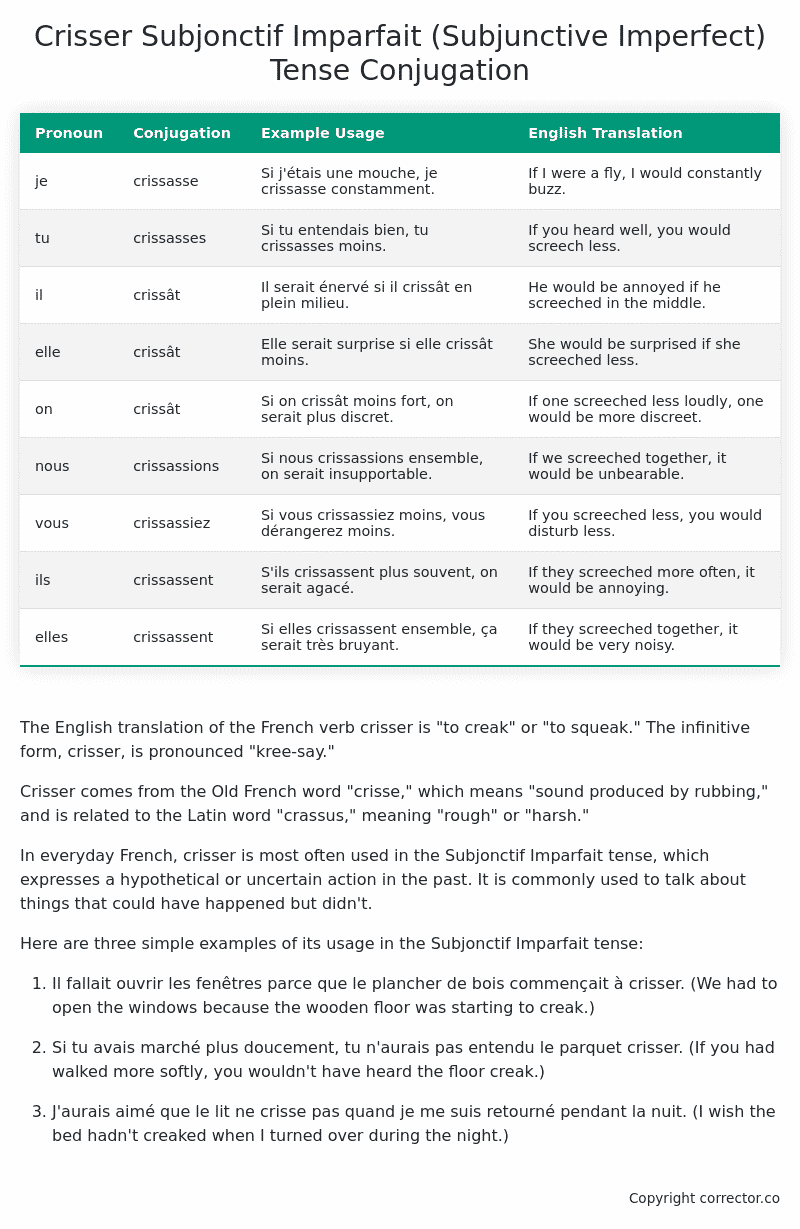Subjonctif Imparfait (Subjunctive Imperfect) Tense Conjugation of the French Verb crisser
Introduction to the verb crisser
The English translation of the French verb crisser is “to creak” or “to squeak.” The infinitive form, crisser, is pronounced “kree-say.”
Crisser comes from the Old French word “crisse,” which means “sound produced by rubbing,” and is related to the Latin word “crassus,” meaning “rough” or “harsh.”
In everyday French, crisser is most often used in the Subjonctif Imparfait tense, which expresses a hypothetical or uncertain action in the past. It is commonly used to talk about things that could have happened but didn’t.
Here are three simple examples of its usage in the Subjonctif Imparfait tense:
-
Il fallait ouvrir les fenêtres parce que le plancher de bois commençait à crisser. (We had to open the windows because the wooden floor was starting to creak.)
-
Si tu avais marché plus doucement, tu n’aurais pas entendu le parquet crisser. (If you had walked more softly, you wouldn’t have heard the floor creak.)
-
J’aurais aimé que le lit ne crisse pas quand je me suis retourné pendant la nuit. (I wish the bed hadn’t creaked when I turned over during the night.)
Table of the Subjonctif Imparfait (Subjunctive Imperfect) Tense Conjugation of crisser
| Pronoun | Conjugation | Example Usage | English Translation |
|---|---|---|---|
| je | crissasse | Si j’étais une mouche, je crissasse constamment. | If I were a fly, I would constantly buzz. |
| tu | crissasses | Si tu entendais bien, tu crissasses moins. | If you heard well, you would screech less. |
| il | crissât | Il serait énervé si il crissât en plein milieu. | He would be annoyed if he screeched in the middle. |
| elle | crissât | Elle serait surprise si elle crissât moins. | She would be surprised if she screeched less. |
| on | crissât | Si on crissât moins fort, on serait plus discret. | If one screeched less loudly, one would be more discreet. |
| nous | crissassions | Si nous crissassions ensemble, on serait insupportable. | If we screeched together, it would be unbearable. |
| vous | crissassiez | Si vous crissassiez moins, vous dérangerez moins. | If you screeched less, you would disturb less. |
| ils | crissassent | S’ils crissassent plus souvent, on serait agacé. | If they screeched more often, it would be annoying. |
| elles | crissassent | Si elles crissassent ensemble, ça serait très bruyant. | If they screeched together, it would be very noisy. |
Other Conjugations for Crisser.
Le Present (Present Tense) Conjugation of the French Verb crisser
Imparfait (Imperfect) Tense Conjugation of the French Verb crisser
Passé Simple (Simple Past) Tense Conjugation of the French Verb crisser
Passé Composé (Present Perfect) Tense Conjugation of the French Verb crisser
Futur Simple (Simple Future) Tense Conjugation of the French Verb crisser
Futur Proche (Near Future) Tense Conjugation of the French Verb crisser
Plus-que-parfait (Pluperfect) Tense Conjugation of the French Verb crisser
Passé Antérieur (Past Anterior) Tense Conjugation of the French Verb crisser
Futur Antérieur (Future Anterior) Tense Conjugation of the French Verb crisser
Subjonctif Présent (Subjunctive Present) Tense Conjugation of the French Verb crisser
Subjonctif Passé (Subjunctive Past) Tense Conjugation of the French Verb crisser
Subjonctif Imparfait (Subjunctive Imperfect) Tense Conjugation of the French Verb crisser (this article)
Subjonctif Plus-que-parfait (Subjunctive Pluperfect) Tense Conjugation of the French Verb crisser
Conditionnel Présent (Conditional Present) Tense Conjugation of the French Verb crisser
Conditionnel Passé (Conditional Past) Tense Conjugation of the French Verb crisser
L’impératif Présent (Imperative Present) Tense Conjugation of the French Verb crisser
L’infinitif Présent (Infinitive Present) Tense Conjugation of the French Verb crisser
Struggling with French verbs or the language in general? Why not use our free French Grammar Checker – no registration required!
Get a FREE Download Study Sheet of this Conjugation 🔥
Simply right click the image below, click “save image” and get your free reference for the crisser Subjonctif Imparfait tense conjugation!

Crisser – About the French Subjonctif Imparfait (Subjunctive Imperfect) Tense
Formation
Common Everyday Usage Patterns
Interactions with Other Tenses
Subjonctif Présent
Indicatif Passé Composé
Conditional
Conditional Perfect
Summary
I hope you enjoyed this article on the verb crisser. Still in a learning mood? Check out another TOTALLY random French verb conjugation!


